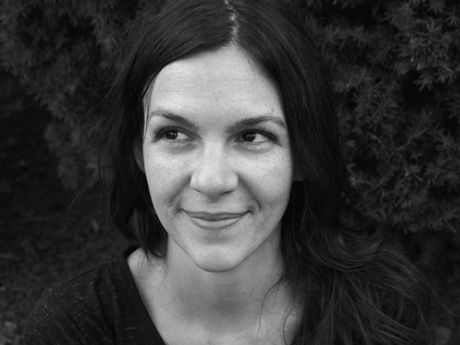In Their Own Words
Stella Corso on “An Actress Approaches Her Scene”

An Actress Approaches Her Scene
I commune with the woman
beside the scent
I am naming it
Hedonists Die at Dusk
fresh-cut greens
an iris drowned
between that and the sun
my appetite eludes me
before these buildings
you could catch a third-degree tan
die happy
the death smell: sour cabbage
rotten potatoes, stale cinnamon toast
from what height will the body explode?
what heat
I think they are tired of me here
I refuse to share the pool
there are children in the pool
they are in the console
everywhere
the buildings appear
Cubist, Surreal, & then Abstract
at 8:05, 1:12, and 3:47, respectively
how do I look from the back?
they say she liked to sneak out
for a swim
they say the bellboy broke her
they wonder
where else can I go
From Tantrum (Rescue Press, 2017). All rights reserved. Reprinted with the permission of the author.
On "An Actress Approaches Her Scene"
This was the year I stopped flying. After staying at a string of so-called haunted hotels, mostly by chance and then with acquired interest, I think I caught a ghost. I believe it happened at the Hotel San Carlos in Phoenix, where this poem was conceived.
The story goes that shortly after the hotel was built in 1928, Leone Jensen, a "pretty blonde" dressed in white, jumped to her death from the rooftop after a bad breakup with the bellboy from a competing hotel down the street. We found this out upon arrival when we discovered the hotel offered ghost tours of its own premises. I remember there was some confusion over whether she was wearing her nightgown or a wedding dress. The attendant, while checking us into the tour in the lobby, informed my partner that he should not be surprised if anything odd occured during his stay, say for instance if his razor went missing, as he was in fact the ghost's "type."
This was also the year I became obsessed with reading the same two books over and over, in tandem, whenever I traveled. I spent a lot of time that week in Phoenix reading William Carlos Williams' Spring and All and Joan Didion's Play It as It Lays by the rooftop pool. Rumor has it that Marilyn Monroe, who frequented the hotel in her heyday, liked to spend time by that pool. I didn't intend to read the two texts as companions, they were just the two voices I favored at the time, but they naturally became part of the same conversation. Both have a spare, cinematic quality, driven by image and mood. Now when I think of Maria cracking open a hard-boiled egg on the steering wheel of her car, "I [see] a girl with one leg / over the rail of a balcony" ("The Right of Way"). Why bother where Maria went? For she went spinning...
So here I was alone with the ghosts- Marilyn, Leone, and Maria. Oh, and the children. We learned during the basement portion of the ghost tour that the hotel had been built on top of another tragedy. Before the hotel was erected, when the land belonged to the American Indians, there had once stood a schoolhouse where three unlucky boys fell onto a drinking well one day while chasing a ball. Would I have awoken in the middle of the night to sounds of playful laughter had I not known that in advance?
I think a lot about falling. I trip and fall in my dreams. I stand away from edges when at consequential heights. You can't tempt fate. There is only a sliver of a moment, I imagine, of either decision or error that separates the living from the dead. Leone was real. Marilyn was real. Maria Wyeth, the nihilistic Hollywood "player" in Didion's chilling novel, offers us a glimpse into the neighboring hopelessness of decadence, of celebrity, of being female- another "pretty blonde" herself. She is fictional but not fiction.
There were sometimes real children too, at the pool. And mothers. What separates women in a more glaringly obvious way than those with children and those without. I did not owe anyone my time by that pool that week, I could read and write and observe the way the light changed shape on a particular building for an entire day, a kind of decadence in itself. How necessary was I then? And who belonged more to the pool- myself, the children, the other women? It is around the pool, the iconic amenity that desires to be both public and private, that these shared pleasures, anxieties, and anguishes—both real and imagined—converge.
So as I mentioned earlier, I did stop flying shortly after that trip for a time, and I stopped hanging around the tops of tall buildings. It was harder to confront my own haunting—of my particular mixture of pleasures, anxieties, and anguishes—than to empathize with the real and fictional ghosts of other women. Now my therapist and I frequently discuss the phenomenon of 'escape velocity.' How it's a sort of miracle. How it asks for a certain degree of belief from the flyer, although in the end, belief is not required to fly the plane.
Consider this analogy provided by NASA on their website under the heading "Escape Velocity: Fun and Games":
"Did you ever watch a group of children playing "Red Rover?" Arms linked up for strength, they chant, "Red Rover, Red Rover, let Sally come over," and Sally's challenge is to break through that chain of linked arms. If she does it, Sally wins."
In order to win here, Sally has to literally throw her body at a crowd of teasers who have joined forces to thwart her every effort.
"If Sally breaks through the chain of arms, she's also demonstrated several key aspects to the space concept of escape velocity. Escape velocity (or a rousing game of Red Rover) requires an object to propel itself with enough speed and thrust to break through a barrier. Sally's reward is the cheers of her teammates. A spacecraft's reward is a journey into space or orbit."
Am I alone in seeing the tragedy of Sally's reward? Even if she "breaks through" she has only succeeded in rousing the "cheers of her [formerly antagonistic] teammates," yet the ever-phallic spacecraft is promised an epic "journey into space or orbit" (NASA).
Poor Sally.



